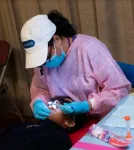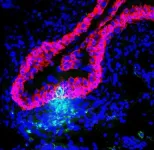(Press-News.org) In the middle of the Indian Ocean lies some of the last coral reef wilderness on Earth. The Chagos Archipelago, a collection of atolls, including Earth's largest - the Great Chagos Bank- is home to reefs that have been largely undisturbed by humans for the last 50 years. Some estimates indicate the Chagos Archipelago may contain more than half of the healthy coral reefs remaining in the entire Indian Ocean. These reefs are protected both by their remote location, and in one of the world's largest no-take marine reserves--the British Indian Ocean Territory (BIOT) marine protected area.
In 2015, scientists at the Khaled bin Sultan Living Oceans Foundation (KSLOF) came to the Chagos Archipelago to assess the status of the reefs. Over the course of two months at sea, an international team of scientists conducted thousands of surveys of the benthic and reef fish communities at over 100 locations across the archipelago. This research was conducted as part of the Foundation's Global Reef Expedition (GRE), a 5-year research mission that circumnavigated the globe to assess the health and resiliency of coral reefs.
"The Global Reef Expedition was designed to evaluate the status of the benthic and reef fish communities and assess the impact of anthropogenic and natural disturbances on coral reef ecosystems," said Alexandra Dempsey, the Director of Science Management at KSLOF and one of the report's authors. "One priority for us was to study reefs with minimal human disturbance, and there was no better place on Earth to do that than the Chagos Archipelago."
Their findings are detailed in a new report, the END
What's happening to the most remote coral reefs on Earth?
Scientists from the Khaled bin Sultan Living Oceans Foundation have published their findings on the state of coral reefs in the Chagos Archipelago, considered the last frontier for coral reefs
2021-03-01
ELSE PRESS RELEASES FROM THIS DATE:
Increase in medicaid managed care for youth linked to slightly more preventive care
2021-03-01
Youth enrollment in Medicaid managed care across all states increased from 65 percent in 2000 to 94 percent in 2017.
Across the country, receipt of preventive care for youth in Medicaid managed care increased from 49 percent in 2000 to 59 percent in 2017, falling short of the 80 percent annual goal set by the Centers for Medicare and Medicaid Services (CMS).
Receipt of preventive care for youth in Medicaid managed care showed a significant increase in 17 states, a significant drop in six states, and no change in 28 states. Tennessee had the largest increase in preventive care associated with Medicaid managed care, while North Carolina showed the largest decrease.
Nationally, the number of children under age 21 enrolled in Medicaid grew from ...
School-based dental program reduces cavities by more than 50%
2021-03-01
A school-based cavity prevention program involving nearly 7,000 elementary school students reduced cavities by more than 50 percent, according to a study led by researchers at NYU College of Dentistry. The findings are END ...
The enemy within: Understanding the mechanisms of r-chop resistance in b-cell lymphoma
2021-03-01
White blood cells or lymphocytes are the soldiers of our immune system that patrol the body via the lymphatic system. While their primary role is to protect the body by scavenging invaders, they can sometimes go rogue and become the enemy. Lymphoma, a type of blood cancer, results from the uncontrolled proliferation of lymphocytes. They are classified as Hodgkins and Non-Hodgkins lymphomas on the basis of the cell of origin and clinical characteristics. Of them, diffuse large B-cell lymphoma (DLBCL) is the most common Non-Hodgkins lymphoma and is highly aggressive and fast-growing.
A combination of rituximab plus cyclophosphamide, doxorubicin, vincristine, and prednisone (R-CHOP) is the standard treatment regimen for ...
Future of immunotherapy could be 'off-the-shelf' treatments
2021-03-01
In a new commentary for the journal Science, an associate vice president for research at The University of Texas at Arlington argues that emerging protein-based immunotherapies could lead to highly effective "off-the-shelf" cancer treatments for more patients.
Jon Weidanz, who also is a professor in the College of Nursing and Health Innovation at UTA, is the author of a perspective regarding the development of cancer immunotherapies.
His article, "Targeting cancer with bispecific antibodies," will appear in the March 5 edition of Science. It evaluates the findings of three studies by researchers at Johns Hopkins University and proposes that an emerging ...
Repurposed arthritis drug did not significantly improve severe COVID-19 pneumonia
2021-03-01
In a study published online February 25, 2021 in The New England Journal of Medicine, a repurposed drug used to treat arthritis did not significantly improve the outcomes of patients with severe COVID-19 pneumonia.
Results of the Phase III clinical trial, conducted by an international team led by senior author Atul Malhotra, MD, research chief of pulmonary, critical care and sleep medicine at UC San Diego Health, found that tocilizumab did not significantly improve clinical status or mortality rate at 28 days for participants who received it compared to a placebo.
"Although our trial was negative based on primary outcomes, we did see some benefits, including an improvement in length of stay of eight days ...
COVID-19 lockdown highlights ozone chemistry in China
2021-03-01
In early 2020, daily life in Northern China slammed to a halt as the region entered a strict period of lockdown to slow the spread of COVID-19. Emissions from transportation and industry plummeted. Emissions of nitrogen oxides (NOx) from fossil fuels fell by 60 to 70 percent.
And yet, environmental researchers noticed that ground-level ozone pollution in Beijing and the Northern China Plain skyrocketed during this time period, despite the decrease of NOx, a component of ozone.
The region is no stranger to severe ozone pollution but until about five years ago, most ozone events occurred ...
Oregon State research shows how tissue's microscopic geometry affects spread of cancer
2021-03-01
CORVALLIS, Ore. - Oregon State University research has revealed a crucial mechanism behind one of humankind's most deadly physiological processes: the movement of malignant cells from one part of the body to another.
Published in the Proceedings of the National Academy of Sciences, the study led by OSU biophysicist Bo Sun shows the role that tissues' microscopic geometry plays in cancer metastasis, the internal spreading of the disease that's responsible for 95% of all cancer deaths.
To develop drugs that effectively combat metastasis, it's fundamentally important to understand what directs the metastatic process, Sun said.
"Our results show the level of tissue fiber alignment, particularly ...
Plant clock could be the key to producing more food for the world
2021-03-01
A University of Melbourne led study has established how plants use their metabolism to tell time and know when to grow - a discovery that could help leverage growing crops in different environments, including different seasons, different latitudes or even in artificial environments and vertical gardens.
Published in the PNAS journal, Superoxide is promoted by sucrose and affects amplitude of circadian rhythms in the evening, details how plants use their metabolism to sense time at dusk and help conserve energy produced from sunlight during the day.
Lead ...
Goodbye UTIs: Duke scientists develop vaccine strategy for urinary tract infections
2021-03-01
DURHAM, N.C. - Anyone who has ever developed a urinary tract infection (UTI) knows that it can be painful, pesky and persistent. UTIs have a high recurrence rate and primarily afflict women -- as many as 50% of women will experience at least one UTI during their lifetime.
However, what if patients could take a vaccine that would prevent future UTIs? In a March 1 study in the Proceedings of the National Academy of Sciences, Duke researchers describe a new vaccination strategy that they think could re-program the body to fight off the bacteria that cause urinary tract infections.
"Although several vaccines against UTIs have been investigated in clinical trials, they have so far had limited success," said Soman Abraham, Ph.D., Grace Kerby Distinguished Professor of Pathology, Immunology ...
Rapid antigen testing for COVID-19: piecing the puzzle together
2021-03-01
A new study from Boston Children's Hospital and the Massachusetts Department of Health compared one of the latest rapid antigen tests for COVID-19 -- the Abbott BinaxNOW -- with a highly accurate PCR test in a high-volume, drive-thru testing environment. They found that the rapid test detected almost all adults who tested positive by PCR if they had had symptoms lasting seven days or less. In symptomatic children with less than seven days of symptoms, the test picked up about 85 percent of true positive cases.
But no matter the age, if the patient had high amounts of virus in their nose, the test caught it 99 percent of the time. It was also able to rule out COVID-19 ...
LAST 30 PRESS RELEASES:
A depression treatment that once took eight weeks may work just as well in one
New study calls for personalized, tiered approach to postpartum care
The hidden breath of cities: Why we need to look closer at public fountains
Rewetting peatlands could unlock more effective carbon removal using biochar
Microplastics discovered in prostate tumors
ACES marks 150 years of the Morrow Plots, our nation's oldest research field
Physicists open door to future, hyper-efficient ‘orbitronic’ devices
$80 million supports research into exceptional longevity
Why the planet doesn’t dry out together: scientists solve a global climate puzzle
Global greening: The Earth’s green wave is shifting
You don't need to be very altruistic to stop an epidemic
Signs on Stone Age objects: Precursor to written language dates back 40,000 years
MIT study reveals climatic fingerprints of wildfires and volcanic eruptions
A shift from the sandlot to the travel team for youth sports
Hair-width LEDs could replace lasers
The hidden infections that refuse to go away: how household practices can stop deadly diseases
Ochsner MD Anderson uses groundbreaking TIL therapy to treat advanced melanoma in adults
A heatshield for ‘never-wet’ surfaces: Rice engineering team repels even near-boiling water with low-cost, scalable coating
Skills from being a birder may change—and benefit—your brain
Waterloo researchers turning plastic waste into vinegar
Measuring the expansion of the universe with cosmic fireworks
How horses whinny: Whistling while singing
US newborn hepatitis B virus vaccination rates
When influencers raise a glass, young viewers want to join them
Exposure to alcohol-related social media content and desire to drink among young adults
Access to dialysis facilities in socioeconomically advantaged and disadvantaged communities
Dietary patterns and indicators of cognitive function
New study shows dry powder inhalers can improve patient outcomes and lower environmental impact
Plant hormone therapy could improve global food security
A new Johns Hopkins Medicine study finds sex and menopause-based differences in presentation of early Lyme disease
[Press-News.org] What's happening to the most remote coral reefs on Earth?Scientists from the Khaled bin Sultan Living Oceans Foundation have published their findings on the state of coral reefs in the Chagos Archipelago, considered the last frontier for coral reefs






